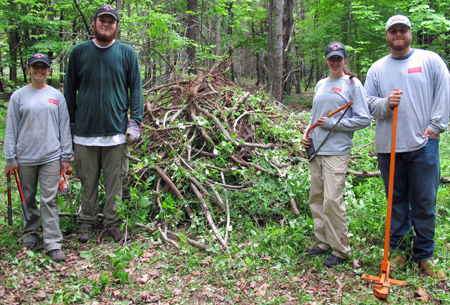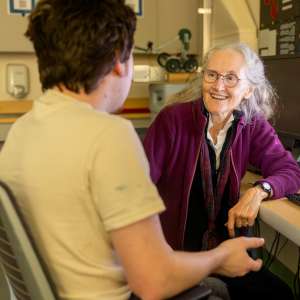Student Researchers Support Local Conservation Efforts

Several Environmental Studies students are learning valuable, real-world research and data-gathering methods and at the same time providing important land and wildlife management information to local conservation efforts, via an internship program through a partnership with the Harris Center for Conservation Education, based in Hancock, NH.
This year, for the first time, the students conducted a comprehensive inventory of an invasive-plant infestation near a trail on Harris Center land and spent two days pulling and cutting those plants (Oriental bittersweet, Japanese and European barberry, and common buckthorn) as a first step towards control. KSC interns and Harris Center staff will be returning to this site, year after year, to conduct follow-up inventory and control efforts. This site is one of only a few in the Monadnock Region for which there will be rigorous pre- and post-management data, and that will enable the Harris Center to assess the success of their invasive plant control efforts. The hope is that this project will serve as a local demonstration site for invasive plant monitoring and management.
The interns have also been inventorying human use—such as fire pits, campsites, and trails—of the land in the College-owned Cabot Preserve between Nubanusit Lake and Spoonwood Pond. They’ve documented a vernal pool in the Preserve, and they’ve begun surveying Spoonwood Pond for aquatic invasive plants. Since the Cabot Preserve has not been closely monitored, the students are gathering valuable data that will allow Keene State to manage this important natural area in the heart of one of the Monadnock Region’s most beautiful wild places.
The student interns are also continuing their analysis of those animals that are killed by cars along Rt. 123 in Hancock. Cataloging even this relatively short section of road is important, explained Brett Amy Thelen, the Harris Center’s science director: “Each year of data adds to our understanding of the impact that roads are having on wildlife in the Harris Center Supersanctuary (and beyond). This year’s surveys have demonstrated that last year’s roadkill numbers were not an anomaly, and that certain species are impacted significantly more than others (namely, amphibians and reptiles). This is an important conservation story. …”
“The internship is an opportunity for students to gain professional and field experience while at the same time providing valuable information that the Harris Center can use to protect and conserve the resources that they manage,” explained Associate Professor of Environmental Studies William Fleeger. “It also allows the College to expand our educational opportunities beyond the classroom and to become a more active partner in addressing the conservation challenges facing our region.” Dr. Fleeger also sees that the partnership contributes to a much more significant and meaningful learning experience for the students. “Involving students in conducting field studies and working alongside conservation professionals as early as possible in their educational experience at KSC helps them understand how theory and practice fit together like pieces of a puzzle. They can see how their education applies to the conservation challenges we face every day and how even the things that we take for granted—such as roads—can have a significant environmental impact. Additionally, the skills and experience they gain make them much more competitive for jobs when they leave Keene State.”





